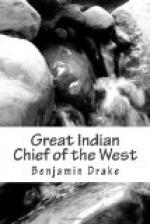It must be obvious to every one familiar with the Indian character, and with the history of our past relations with this people, that the success of this plan, will depend, in a very great degree, upon the manner in which its details shall be executed by the government. A failure will inevitably ensue, if white men are permitted to come in contact with the Indians. The strong arm of the military power of the United States, will be requisite to stay the encroachments of our people, whose love of adventure and whose thirst for gain, will carry them among the Indians, unless arrested by more cogent considerations than a sense of duty, or the prohibitions of the statute book.
Instead of attempting to supply them with goods by licensing traders to reside among them, they should be encouraged to sell their furs and peltries and to make their purchases in the United States. On the former system they are liable to constant imposition, and the very articles which the traders carry among them, are worthless in kind and poor in quality; but if the Indians traded with us, within the limits of the United States, they would have the competition arising from a number of buyers and sellers, they would obtain better prices for their furs and procure more valuable articles, upon fairer terms, in exchange. They would also be benefitted by observing our manners and customs, adopting our style of dress, learning the value of property, and gaining some knowledge of agriculture and the use of mechanical tools, and implements of husbandry. But the most important advantage to be gained by their trading within the United States, would be in their protection from imposition. It has been truly and forcibly remarked,
“Humanity shudders at the recital of the nefarious acts practised by the white traders upon the Indians. Yet not half of them are known or dreamed of by the American people. We refer again, to Mr. Tanner’s Narrative, which every man who has a vote on this subject ought to read. Here we find the traders sometimes taking by force, from an Indian, the produce of a whole year’s hunt, without making him any return, sometimes pilfering a portion while buying the remainder, and still oftener wresting from the poor wretches, while in a state of intoxication, a valuable property, for an inadequate remuneration. In one place, our author tells of an Indian woman, his adopted mother, who, “in the course of a single day, sold one hundred and twenty beaver skins, with a large quantity of buffalo robes, dressed and smoked skins, and other articles, for rum.” He pathetically adds, “of all our large load of peltries, the produce of so many days of toil, so many long and difficult journeys, one blanket and three kegs of rum, only remained, besides the poor and almost worn out clothing on our bodies.” The sending of missionaries, to labor by the side of the miscreants who thus swindle and debauch the ignorant savage, is a mockery of the office, and a waste of the time of these valuable men. If the Indians traded within our states, with our regular traders, the same laws and the same public sentiment which protects us, would protect them.”




